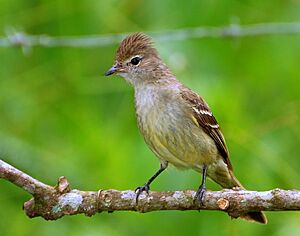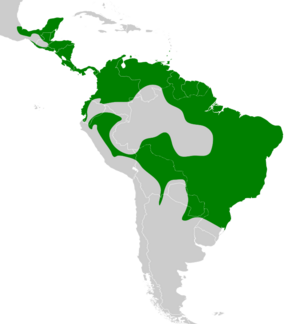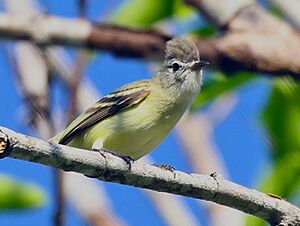Yellow-bellied elaenia facts for kids
Quick facts for kids Yellow-bellied elaenia |
|
|---|---|
 |
|
| At Registro, São Paulo State, Brazil | |
| Conservation status | |
| Scientific classification |
|
| Kingdom: | Animalia |
| Phylum: | Chordata |
| Class: | Aves |
| Order: | Passeriformes |
| Family: | Tyrannidae |
| Genus: | Elaenia |
| Species: |
E. flavogaster
|
| Binomial name | |
| Elaenia flavogaster (Thunberg, 1822)
|
|
| Subspecies | |
|
4, see text |
|
 |
|
| Script error: The function "autoWithCaption" does not exist. | |
Script error: No such module "Check for conflicting parameters".
The yellow-bellied elaenia (Elaenia flavogaster) is a small bird. It belongs to the tyrant flycatcher family. These birds live in many places. You can find them from southern Mexico all the way to northern Argentina. They also live on islands like Trinidad and Tobago.
Contents
What Does a Yellow-bellied Elaenia Look Like?
Adult yellow-bellied elaenias are about 16.5 centimeters (6.5 inches) long. They weigh around 24 grams (0.85 ounces). Their upper feathers are olive-brown. They have a white ring around each eye.
These birds have a special crest of feathers on their head. It looks a bit bushy and is split in the middle. There's a white patch on their crown where the crest parts. Their throat is light-colored, and their chest is grayish. The lower part of their belly is a pale yellow.
You can often hear them before you see them! Their call sounds like a nasal breeer. Their song is a wheezing sound, like zhu-zhee-zhu-zhee.
Where Do Yellow-bellied Elaenias Live?
This bird is very common in many different places. They like areas with some trees, like open woodlands. You can also find them in scrublands, gardens, and even on farms. They are often noisy and easy to spot.
What Do Yellow-bellied Elaenias Eat?
Yellow-bellied elaenias eat both berries and insects. They are good at catching insects in the air. They usually sit on a branch and then fly out quickly to grab an insect. Sometimes, they also pick insects off plants. These birds might even join groups of different bird species looking for food. When they do, they usually stay high up in the trees.
How Do Yellow-bellied Elaenias Reproduce?
Yellow-bellied elaenias build a cup-shaped nest. The female bird lays two cream-colored eggs. These eggs have reddish spots, especially on the wider end. The female sits on the eggs for about 16 days to keep them warm. After the eggs hatch, the young birds stay in the nest for about the same amount of time before they can fly.
Sometimes, small animals like common marmosets might try to take eggs or baby birds from the nests. This can happen more often in the dry season when other foods are hard to find. The parent birds will try to protect their nests from these animals.
Are Yellow-bellied Elaenias in Danger?
The yellow-bellied elaenia is a very common bird. It lives in a large area. Because of this, experts do not think it is in danger of disappearing. The IUCN (International Union for Conservation of Nature) lists it as "Least Concern." This means their population is stable and healthy.
 | Delilah Pierce |
 | Gordon Parks |
 | Augusta Savage |
 | Charles Ethan Porter |



